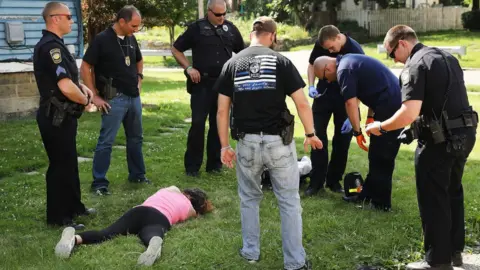Opioid crisis: Overdose rates jump 30% in one year
Opioid overdoses were up 30% in the last year across the United States, a study by a federal agency has found.
The US Midwest was worst hit with overdoses surging by 70%, according to the data from the Centers for Disease Control and Prevention (CDC).
The Vital Signs study tracked emergency room visits due to an opioid overdose between 2016 June and September 2017.
The US opioid crisis claimed 63,600 lives in 2016, the National Center for Health Statistics has previously said.
The CDC said tracking hospital visits was more comprehensive than counting overdose related deaths.
"Long before we receive data from death certificates, emergency department data can point to alarming increases in opioid overdoses," said acting director Anne Schuchat.
US Midwestern states - Wisconsin, Illinois, Indiana, Ohio and Missouri - noticed the highest jump in cases.
 Getty Images
Getty ImagesThe highest jump among the Midwestern states was 109% in Wisconsin.
Research shows that people are more likely to have a second overdose when they have already had one, said CDC behavioural scientist Alana Vivolo-Kantor.
"Emergency department education and post-overdose protocols, including providing naloxone and linking people to treatment, are critical needs," said Ms Vivolo-Kantor.
Naxolone, which has increasingly been distributed among US police departments, can stop and reverse an overdose as it is occurring.
More from the CDC study:
- Overdoses increased for men and women and all age groups
- All five main US regions experienced rate increases in this order: Midwest (70%), West (40%), Northeast (21%), Southwest (20%), Southeast (14%)
- Individuals aged 35-54 saw a 36% increase in opioid overdose cases
- The only significant decrease was in the state of Kentucky (15%)
- Cities with over 1m people saw a 54% increase, but a continued rise in cities and towns of all sizes was recorded
President Trump called the opioid epidemic a "national shame" in October and declared it a public health emergency.
He announced a plan to tackle the crisis, which takes 140 lives per day across the country.

